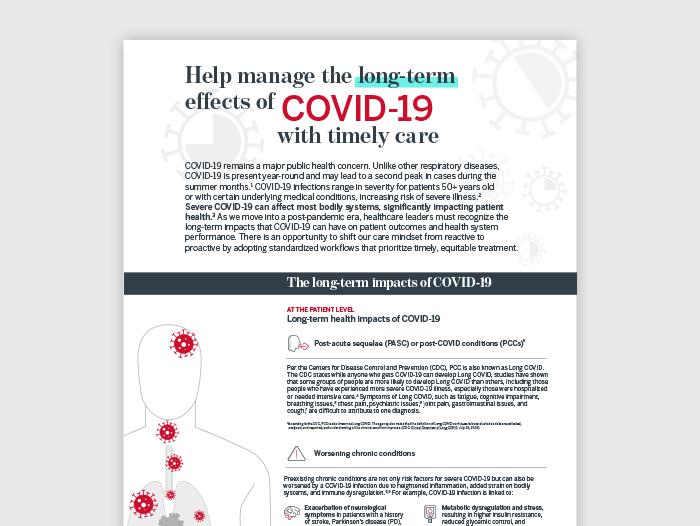Auto logout in seconds.
Continue LogoutGoing into the fall, the United States may see a new surge of respiratory viruses, including COVID-19, respiratory syncytial virus (RSV), and influenza. To protect against illness, federal health officials are encouraging people to get vaccinated once new shots against these three viruses are available.
A new COVID-19 booster
In the United States, COVID-19 hospitalizations have been rising steadily since July, in part due to more people staying inside from the summer heat, as well as new COVID-19 omicron subvariants. Two of these subvariants are EG.5.1, nicknamed "Eris," and BA.2.86, nicknamed "Pirola."
Currently, drug manufacturers, including Pfizer, Moderna, and Novavax, are all awaiting FDA approval for their updated COVID-19 boosters, with shots going out as soon as September. The boosters target the XBB.1.5 subvariant, which EG.5.1 and another circulating subvariant FL.1.5.1 are descended from.
So far, early data on the vaccines suggest that they are effective against the EG.5.1 subvariant. According to a federal health official, the boosters should also be effective against the BA.2.86 subvariant, but testing is still ongoing.
"Unless we get another variant that pops up, we should have a really good match," said Linda Yancey, an infectious disease specialist at Memorial Hermann Health System.
Official recommendations on who should receive an updated COVID-19 booster and when will be released after the shots are cleared by both FDA and CDC.
New RSV vaccines
According to the New York Times, RSV is growing as a major respiratory threat, particularly to older adults, immunocompromised individuals, and young children. "R.S.V. has a burden of disease similar to flu in older adults — it can make you very, very sick," said Helen Chu, a physician and immunologist at the University of Washington.
Earlier this year, FDA approved two RSV vaccines (Pfizer's Abrysvo and GSK's Arexvy) for adults ages 60 and older. Currently, CDC recommends eligible individuals speak with their doctors about the benefits and risks of getting vaccinated against RSV.
To protect young children against RSV, CDC has recommended all infants receive Sanofi and Astra Zeneca's new preventive monoclonal antibody treatment Beyfortus. The recommendation applies to all infants under the age of eight months and high-risk toddlers up to 19 months. Newborns are recommended to receive the treatment within one week of birth or close to their hospital discharge.
FDA also recently approved a maternal vaccine that would protect infants from severe illness from RSV for six months after they're born. The maternal vaccine is given in the third trimester between 32 and 36 weeks of gestation. The vaccine is currently waiting for CDC review, and it may not be available until later in the fall.
The latest flu vaccine
The annual flu vaccine has been updated with a new formula to target the strains that are most likely to circulate this season. CDC continues to recommend that all individuals ages six months and older be vaccinated against the flu, with some exceptions.
When should you get vaccinated?
According to the Times, it's unclear when these respiratory viruses will re-emerge, but people are recommended to get vaccinated early in the fall, such as September or October, to give their bodies time to build immunity.
When it comes to COVID-19 vaccines, people may also want to talk to their doctors about the best timing for a shot depending on individual risk factors, as well as when they want to have peak protection.
If you want, you can get the COVID-19 and flu vaccines at the same time. These shots were often given together last year, and studies show that they can be safely administered in one visit.
However, because RSV vaccines are still new, the data on their safety and effectiveness is still limited. In clinical trials, there were rare cases of someone who got an RSV and flu vaccine at the same time experiencing severe side effects.
"RSV given separately from the other two may be the ideal," said Manisha Juthani, commissioner of the Connecticut Department of Public Health
According to health officials, a good strategy for eligible adults hoping to get vaccinated is to first get an RSV shot, then COVID-19 and flu shots before Halloween. CDC is also expected to release official recommendation on administering the different vaccines together in the next few weeks. (Nirappil/Sun, Washington Post, 8/21; Mandavilli, New York Times, 8/23; Abbott/Kamp, Wall Street Journal, 8/22)
Don't miss out on the latest Advisory Board insights
Create your free account to access 1 resource, including the latest research and webinars.
Want access without creating an account?
You have 1 free members-only resource remaining this month.
1 free members-only resources remaining
1 free members-only resources remaining
You've reached your limit of free insights
Become a member to access all of Advisory Board's resources, events, and experts
Never miss out on the latest innovative health care content tailored to you.
Benefits include:
You've reached your limit of free insights
Become a member to access all of Advisory Board's resources, events, and experts
Never miss out on the latest innovative health care content tailored to you.
Benefits include:
This content is available through your Curated Research partnership with Advisory Board. Click on ‘view this resource’ to read the full piece
Email ask@advisory.com to learn more
Click on ‘Become a Member’ to learn about the benefits of a Full-Access partnership with Advisory Board
Never miss out on the latest innovative health care content tailored to you.
Benefits Include:
This is for members only. Learn more.
Click on ‘Become a Member’ to learn about the benefits of a Full-Access partnership with Advisory Board
Never miss out on the latest innovative health care content tailored to you.


